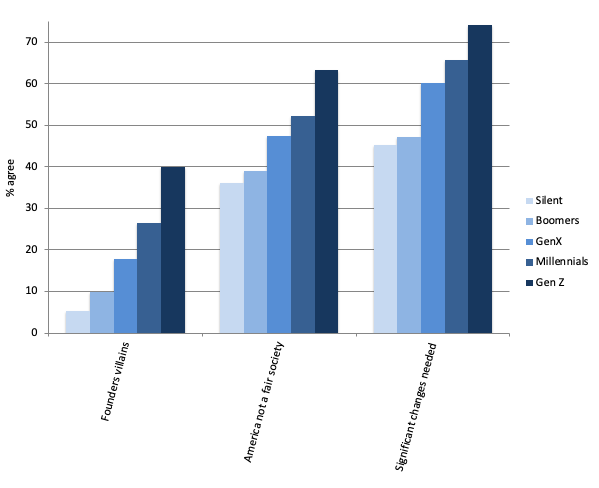Is Gen Z really more conservative?
No -- instead, they are more likely to support radical change
According to several recent articles, Gen Z — especially Gen Z men — are strikingly more conservative than the Millennials before them.
It’s true that more young adults voted for Trump in 2024 than did in 2020, but, as I pointed out in a recent article in the Atlantic, that’s not the same as identifying as conservative. In fact, fewer 18- to 29-year-old Americans identified as conservative in 2024 than in 2012, the last year all 18- to 29-year-olds were Millennials. Thus, Gen Z young adults, even the men, are actually less conservative than Millennials at the same age (see Figure 1).
Figure 1: Percent of U.S. 18- to 29-year-olds who identify as conservative, presidential election years, 2008-2024. Source: Cooperative Election Study.
Where Gen Z stands out is not in conservatism but in its ideological opposite: The desire for change, and sometimes radical change. Gen Z is more pessimistic than young adults in past decades, more likely to agree they find it difficult to “hold out hope for the world” or that they “often wonder if there is any real purpose to my life in light of the world situation.” Those pessimistic beliefs have grown more among young liberals, but they’ve also grown among young conservatives since the late 2000s. Pessimism, by definition, means dissatisfaction with the status quo.
With fewer young adults identifying with a political party (more identify as Independents), Gen Z is ripe for the picking of any candidate or party that promises change. In my view, that’s why more voted for Trump in 2024 than 2020. In 2024, he was the opposition. In 2020 he was the incumbent. Gen Z voters want change where ever they can find it.
When I was writing Generations, the result that stunned me the most was from this 2020 poll (see Figure 2).
Figure 2: Percent of U.S. adults who agree with negative statements about the country, by generation, 2020. Source: Democracy Fund Voter Survey; analysis in Generations, Figure 6.54.
Three out of four Gen Z’ers believe that “significant changes” to the U.S. government’s “fundamental design and structure” are necessary. (As do the majority of Millennials and Gen X, which is also news). Nearly 2 out of 3 disagreed that “America is a fair society where everyone can get ahead.” Gen Z was also negative about the country’s past; 4 out of 10 said that the founders of the U.S. are “better described as villains” than as “heroes.” These are not the beliefs of a thriving democracy.
These beliefs don’t just explain the swing toward Trump among younger voters. They do an even better job of explaining the appeal of candidates like Zohran Mamdani, the democratic socialist who recently won the Democratic primary election for mayor of New York City. Mamdani has said he doesn’t like capitalism and favors more government programs to help voters economically, including freezing rents and making bus service free. For Gen Z voters who think “significant changes” to government are needed, Mamdani promised a much more radical change than his closest opponent, former governor Andrew Cuomo.
In the coming years, I believe we will see more candidates who promise fundamental change to government, perhaps on both the left and the right. Although older generations also express some dissatisfaction with the status quo, it’s less than Gen Z’s deep well of pessimism. This sets up a growing generational divide between younger generations who want to tear the whole thing down and start over and older generations who think that’s not such a great idea. Hold on to your seats.





This is actually extremely helpful and hopeful. I continue to read articles stating that young men are both conservative and angry MAGA types. To know that what they long for is meaningful change completely alters the conversation. As for tearing things down and starting again, we may find that this isn’t a feature that sets them apart. I’m a boomer, and know plenty of people in every generation - including my own - who feel our system is broken. (I’m a psychotherapist, so hear from a wide variety of people.) I only hope that tearing it down doesn’t mean replacing it with fascism and concentration camps, which is the direction we are headed.